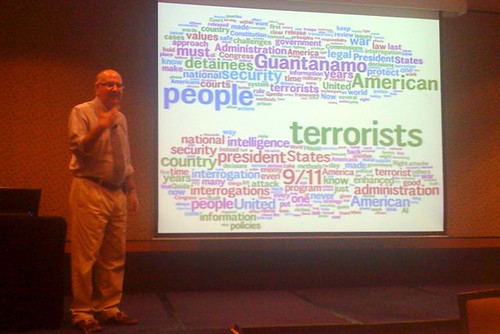Dr Ross J Todd observes, over at School Libraries 21C that, in many schools, outcomes and impacts are often “assumed some how to be lurking in there”. When a new syllabus comes in, educators often try to bend existing units of work to fit the new document, rather than to use the new outcomes to plan new, statistically-valid, pre- and post- tests that will enable staff to prove that learning has occurred. I’m guilty of that myself, trying to stretch old print-based resources to fit new units when library budgets are too tight.
Unless a school has cause to collect measurable data of the students’ achieved outcomes – eg. schools defending expeditures in Priority Schools Programs; teacher librarians undertaking post-graduate study (and requiring valid results for their assignments); etc – that all-important post-test, and results analysis, often get lost in the shuffle in the end-of-term mayhem, and that often happens four times a year, of course.
In a previous school, long before outcomes appeared in every KLA syllabus, we had our first taste of the power of collaboratively-planning valid, measurable, pre- and post- tests, when we re-examined our school-based science and technology units, spent a considerable amount of money on relevant resources that truly supported what we were hoping to achieve, and ensured that every S&T unit maximised the capacity for Talking & Listening (in English).
Schools need to plan for constant revisiting of syllabuses and evaluation strategies. I was going to say especially in schools with a high turnover of staff but, no, every school needs to do this in a structured, cyclic way.
Certainly, I’ve noticed renewed opportunities for the teacher-librarian to be more involved in collaboratively-planning valid, measurable, pre- and post- tests as a result of my voluntary role as an editor of several teaching colleagues’ half-yearly student reports. When educators have to clearly articulate just where on the learning continuum each student is, and for each key learning area, the traditional, waffly comments of yesteryear just don’t wash. I can see where certain gaps are exposed, and then I try my best to lend assistance.
Statements about students’ achievement, at our school, now have to be written in terms of outcomes. The new online reports, as daunting as they are, do seem to be assisting with providing a strong focus on value-added results. Of course, the new reports have brought in an additional problem: many outcomes sound too much like eduspeak, and that can really make some parents feel even more out of the loop.
And, of course, sometimes the best ideas for how something could have been evaluated come too late. (Hurray for cyclic programs, which can be improved each time the units are revisited.)
Similarly, a few years ago, I volunteered my services as an editor of the Annual School Report, and we noticed that the library had, previously, not really rated a mention in the ASR. The last few years have seen added paragraphs about the interrelationship of this school library with other important, high-profile school programs and events: Holiday Reading Is Rad, reading picnics, visiting storytellers, participation in annual community artshows, book reviews in the local newspaper, Circle Time, Premier’s Reading challenge, book raps, and a wiki.
This year, I hope to add OASIS Library borrowing statistics, too, and this is another easily-obtained set of data.
How to ensure that higher order thinking, and pre- and post-tests, are vital elements of the teaching program?
Well, I’m a great advocate of the online book raps and event raps run by the School Libraries and Information Literacy Unit (NSW DET). Programming and planning (including evaluation strategies) are provided. At the conclusion of each rap, we have solid data of learning progress, and the students’ jointly-constructed responses to the rap points remain online, for parents to visit via home or local library computers.
While the maximum benefit from book raps would, ideally, include teachers and the teacher librarian working collaboratively on the rap points, we have also used a highly effective “withdrawal of rappers” strategy, that requires the students reporting back to their classmates. We timetable what is achievable, and that can vary. Because book rapping takes place in the school library – and the new interactive whiteboard arrived this term, and is also in the library – the profile of the library is constantly being flagged (and raised).
Our school wiki (which I instigated, and made a point of branding as the Penrith PS Library Wiki (see “Scan” vol 28 no 1, 2009, pp 30-37) has several pages dedicated to outcomes-based annotations of the students’ progress, much of it in the students’ own words – pre-, during and post- tests, as gathered through whole-school Talking & Listening programs, such as Circle Time (see “Scan” vol 26 no 4, 2007, pp 4-7).

